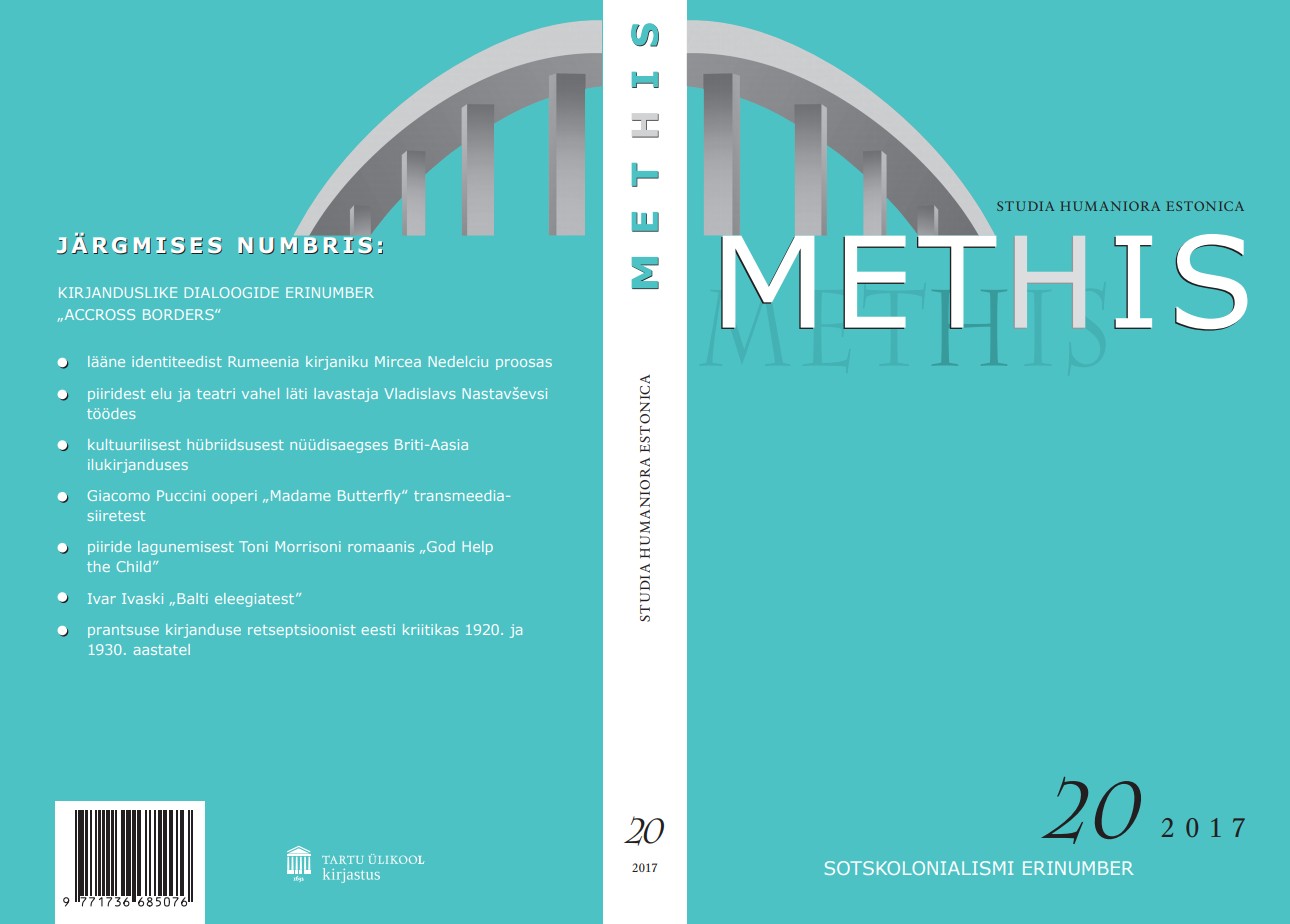Nõukogulik või ebanõukogulik? Veel kord olmekirjanduse olemusest, tähendusest ja toimest / Soviet or Anti-Soviet? Once more on the nature, meaning, and function of 'everyday literature'
DOI:
https://doi.org/10.7592/methis.v16i20.13892Keywords:
ilukirjandus, kirjanduskriitika, sotsioloogia, Nõukogude-uuringud, emantsipatsioon, fiction, literary criticism, sociology, Soviet studies, emancipationAbstract
Artiklis vaatlen olmekirjanduse nimelist nähtust – 1970. ja 1980. aastate vahetusel Nõukogude Eestis ilmunud romaane, mille keskseks teemaks olid kaasaegsed sugudevahelised suhted. Asetan olmekirjanduse kitsalt eesti kirjanduspildist laiemale, üleliidulisele taustale, mida kujundavad paljuski sotsioloogia areng ning selle keskajakirjanduslik kajastus. Muuhulgas sõna emantsipatsioon kasutuse kaudu teostes näitan romaanide käsitluslaadi vastavust kaasaegsele ajakirjanduslikule käsitluslaadile. Seeläbi paigutan romaanid ajakirjandusega ühte, „hilisnõukogude liberaalsesse kriitilisse diskursusse“, kus võim ja vastupanu, nõukogulikkus ja ebanõukogulikkus on tihedasti läbi põimunud.
In this article, I examine a phenomenon known as 'everyday literature' (olmekirjandus)—novels published in Soviet Estonia at the turn of the 1970s—1980s. By name, these novels could be expected to depict contemporary everyday life, whereas they really focus on gender relations, marital and especially extramarital relationships. Contemporary criticism did not value such books highly; nevertheless, they stood out as a corpus and succeeded in evoking a discussion. In retrospect, everyday novels have been interpreted as a particular incarnation of light/lowbrow literature, as timid harbingers of postmodernism, and as proto-feminist works. While these interpretations all have their grounds, they operate in a narrower context of Estonian (national) literature. In this article, I set everyday novels on a wider background of the cultural situation in the contemporary Soviet Union.
This situation was heavily influenced by the rebirth of sociology and its reflections in print media. Having been banned meanwhile since the middle of the 1950s, sociology again became a permitted discipline in the Soviet Union. Among prominent areas of study were matters concerning the private sphere: family life and gender dynamics. That in turn gave rise to an extensive discussion of gender relations and “the woman question” in contemporary print media—in newspapers, culture magazines and popular science magazines. The discourse was one of sharp antagonism, tending to ridicule the state-endorsed slogan of women’s emancipation and gender equality, and to pit men and women against one another.
I argue that the vocabulary and the general approach of everyday novels closely corresponds to that of the print media, and acknowledging this allows for the most fruitful interpretation of these works. I demonstrate the close proximity of the novels to media accounts, describing the general problem settings of the novels and, more closely, the use of the very word 'emancipation' itself. Both novels and media texts feature the so-called emancipated woman and her (lacking) counterpart – either an irresponsible womanizer or a weak drunkard of a man. Neither male or female characters are content with the situation and while the blame may shift from one party to another, in novels as well as in media accounts, the phenomenon of emancipation itself is considered a negative, but most importantly, a ridiculous thing.
The corpus seems to have awoken opposite intuitions already in its contemporary audience. As most often the case with the literature of the Soviet era, a question of conformism and resistance, of Sovietness and anti-Sovietness has implicitly coloured the discussions of everyday literature. On the one hand, the novels were considered petty, taking on subjects familiar from print media and offering no new depths in their approach. The latter was perhaps most clearly expressed in a 1980 piece by Rein Veidemann that gives its name to the current article, “On the nature, meaning, and function of everyday literature”; according to an exile Estonian reviewer’s ironic comment, everyday novels exemplified the truest socialist realism. On the other hand, they were read very widely and succeeded in stirring up a controversy, thus proving to be at least somewhat unconventional in the time and place of their publication. An evident reason are open references to sexual matters; however, it is not irrelevant that they touched upon the problems of changing gender relations, even if the analysis they offered did not satisfy the audience.
In addition to sketching out the general power relations of Soviet Russia and Soviet Estonia, and pointing out the influence of the central Soviet print media on Estonian culture, the framework of postcolonial studies emphasizes that Sovietness and anti-Sovietness does not have to be an either/or question—those seemingly opposite intuitions may well thrive side by side. Drawing a parallel between the novels and media texts among other things allows them to be placed within the 'late Soviet liberal critical discourse', a term used to describe the metaphor-laden media discourse of the 1970s—1980s Soviet Union. This discourse is simultaneously a locus of conformism and resistance, avoiding certain taboo subjects and displaying fiercely critical attitudes toward other, more “harmless” subjects as a manner of managing the dissatisfaction of the Soviet citizen; whereas “the woman question” has been argued to be namely one of such token subjects. Positioning the novels within the late Soviet liberal critical discourse similarly on the one hand blocks the interpretation of the novels as something unprecedented and, no less, subversive and dissident or even implicitly nationalist; on the other hand, it does not completely cut off their critical potential.


